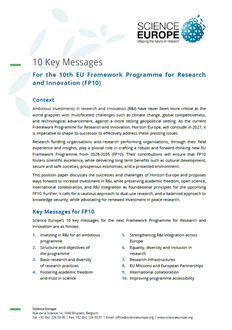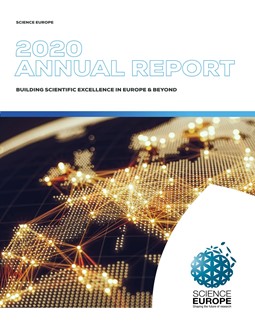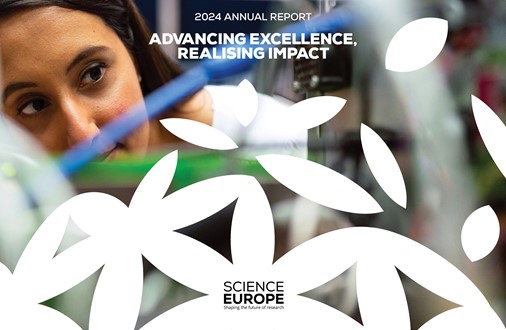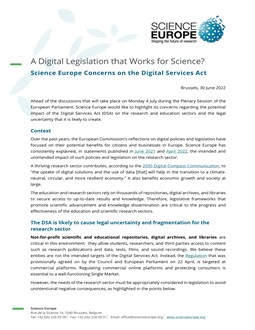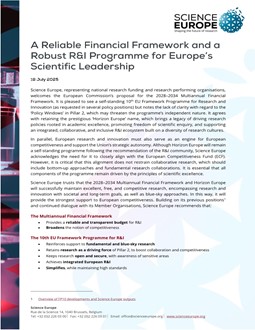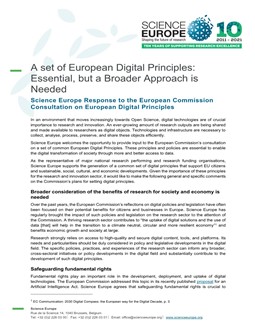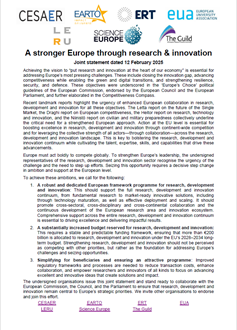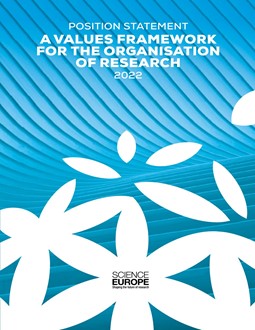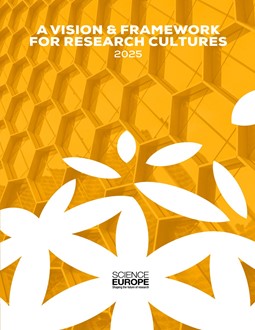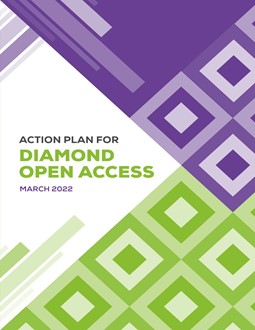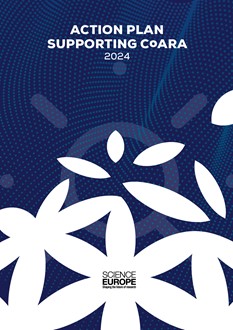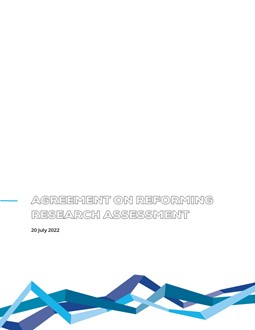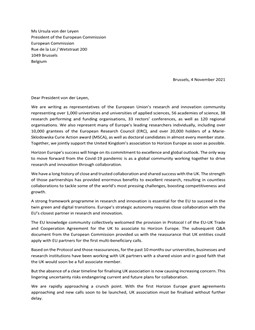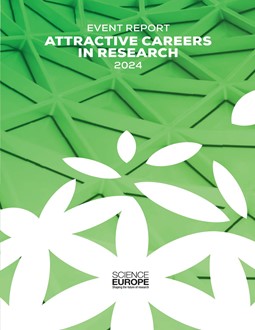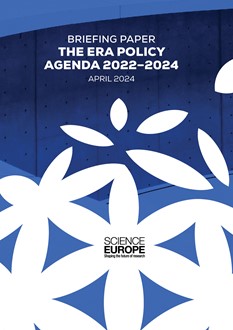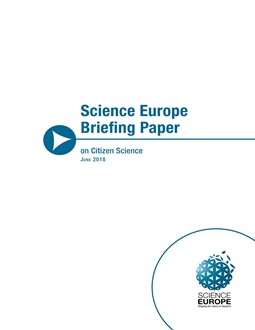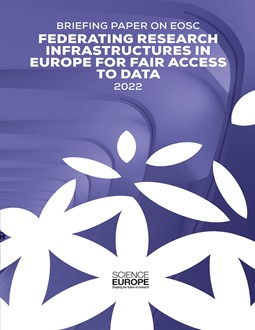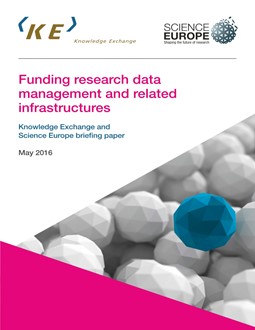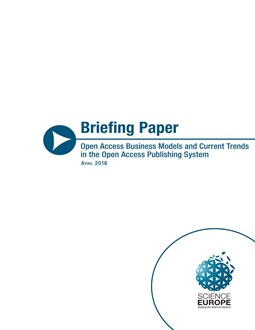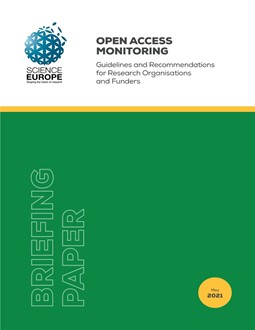Member-only content is available on this page. Please log in to view this content.

Search
206 item(s) found
10 Key Messages for the 10th EU Framework Programme for Research and Innovation (FP10)
This position paper discusses the successes and challenges of Horizon Europe and proposes ways forward to increase investment in R&I, while preserving academic freedom, open science, international collaboration, and R&I integration as foundational principles for the upcoming Framework Programme for Research and Innovation (FP10).
2020 Annual Report
The year 2020 saw a global pandemic attest to the value of science. In the race for COVID-19 treatments and vaccines, Science Europe’s Member Organisations were at the forefront of the global response and our association became more relevant and important than ever.
2024 Annual Report: Advancing Excellence, Realising Impact
Science Europe made excellent progress on its research policy priorities in 2024, delivering key outputs in various areas, including science communication, research assessment, open science, the sustainability of research, international collaboration, and equality, diversity, and inclusion.
A Common Scale for Our Common Future: Exergy, a Thermodynamic Metric for Energy
A major challenge in striving for energy efficiency is the selection of technological systems, particularly given the need to consider multiple environmental, economic and social concerns. In addition, the general public, policy makers and experts alike misunderstand the physical nature of energy and hence its efficient use. After decades of fragmented agreements, regulations, treaties, strategies, indicators, targets, directives and communications, the European Union (EU) in its Energy Union strategy needs to take the lead in restoring the energy debate to firm foundations: those of thermodynamics, the science of energy.
A Digital Legislation That Works for Science?
Ahead of discussions on 4 July in the European Parliament, Science Europe highlights its concerns regarding the potential impact of the Digital Services Act on the research and education sectors and the legal uncertainty that it is likely to create.
A Reliable Financial Framework and a Robust R&I Programme for Europe’s Scientific Leadership
Science Europe's initial response to the European Commission's proposals for the next EU budget and new Horizon Europe, including a set of recommendations. While the proposals provide a significant budget increase and the Framework Programme remains self-standing, further clarification on its relation to the Competitiveness Fund is needed.
A set of European Digital Principles: Essential, but a Broader Approach is Needed
Science Europe Response to the European Commission Consultation on European Digital Principles
A Stronger Europe through Research and Innovation
Science Europe, together with CESAER; the European Association of Research and Technology; the European Round Table for Industry; the European University Association, the League of European Research Universities; and The Guild have joined together to call for a robust and dedicated European framework programme for research and innovation.
A Values Framework for the Organisation of Research
Science Europe launches a framework of shared values that serve as a guide to contribute to fostering a forward-looking research culture within the European Research Area, and globally.
A Vision & Framework for Research Cultures
Science Europe presents ‘A Vision and Framework for Research Cultures’. It synthesises our recent work across numerous policy topics focussing them on the shared objective of R&I systems to advance knowledge and enable the quality and impact of research.
Action Plan for Diamond Open Access
Science Europe, cOAlition S, OPERAS, and the French National Research Agency (ANR) present an Action Plan to further develop and expand a sustainable, community-driven Diamond OA scholarly communication ecosystem.
Action Plan Supporting CoARA
This action plan details the activities Science Europe undertakes to contribute to the Coalition for Advancing Research Assessment (CoARA) in the coming years.
Advancing Research Integrity Practices and Policies: From Recommendation to Implementation
This workshop aimed to advance implementation of the recommendations published in Science Europe’s Survey Report ‘Research Integrity Practices in Science Europe Member Organisations.’ The workshop explored the challenges in taking forward certain recommendations through the discussion of case studies presented by organisations that have already tackled some of the more difficult issues.
Agreement on Reforming Research Assessment
This Agreement sets a shared direction for changes in assessment practices for research, researchers, and research performing organisations, with the goal to maximise the quality and impact of research. It includes principles, commitments, and timeframes for reforms and lays out principles for a Coalition of organisations willing to work together in implementing the changes.
Allows for Mining but Doesn't Strike Gold: Science Europe Copyright Statement
The recent legislative proposal from the European Commission to reform EU copyright law addresses some needs, but not to the full extent required. Science Europe calls for research and data mining exceptions to ensure that copyright legislation is friendly to research and innovation.
An ERA Governance Fit for Purpose
Science Europe Position on the Involvement of Stakeholders in the ERA Governance
An Inclusive ERA for Excellent Research
Science Europe’s Reaction to the Commission Proposal for a Council Recommendation on a Pact for Research and Innovation.
Association of the UK to Horizon Europe must go forward
The European Union’s research and innovation community urges the European Commission and UK Government to work towards a successful UK association to Horizon Europe as soon as possible.
Attractive Careers in Research: the Expectations & Roles of Different Stakeholder Groups
This report summarises the key messages and perspectives collected during a two-part workshop exploring the common and different expectations for careers in research by various stakeholder groups.
Briefing on the ERA Policy Agenda
This briefing on the ERA Policy Agenda presents actions and advocacy points from Science Europe on the ERA Actions that it contributes to.
Briefing Paper on Citizen Science
Citizen science is a growing movement that enlists the public in scientific discovery, monitoring, and experimentation across a wide range of disciplines. This briefing paper looks in detail at the evolution of citizen science and citizen science policy, provides examples of initiatives from around the world, and considers the future of the activity.
Briefing Paper on EOSC: Federating Research Infrastructures in Europe for Fair Access to Data
One of the most prominent initiatives in the digital and open transition of research is EOSC. This federation of existing research data infrastructures in Europe aims to create a web of FAIR data and related services for research
Briefing Paper on Funding Research Data Management and Related Infrastructures
This joint briefing paper with Knowledge Exchange informs the discussion on the funding of Research Data Management (RDM) and related infrastructures in Europe, helps raise awareness of the current challenges, and communicates opportunities for co-ordinated action to relevant stakeholders. The paper highlights that the funding of Research Data Infrastructures, enabling RDM, comes from a great variety of sources and institutions that have different responsibilities and that operate at local, national, and international levels.
Briefing Paper on Open Access Business Models and Current Trends in the Open Access Publishing System
Decisive action is needed to transition towards more effectively and efficiently towards an Open Access publishing system. This paper presents some of the recent trends and developments in the transition to Open Access, as well as various business models currently in use which aim to facilitate this transition. It also highlights expected benefits and underlines remaining challenges.
Briefing Paper on Open Access Monitoring
This briefing paper aims to support decision makers at research organisations and research funders to develop new monitoring exercises or assess and improve existing processes to measure the Open Access status of publications.

